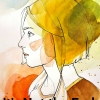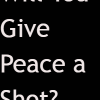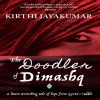
I capture. I capture all the time. Scenes that I see. Scenes that I don’t want to see. Scenes that I am forced to see. Now. Then. Afterwards. Before. Yesterday. Today. Tomorrow. A long time ago. A while later. Someday, sometime, somewhere. And in all these pictures I capture, I learn that is all we have. In this world that we call our own, one day bleeds into the next. We sleep with the fear of awaking, and with the fear of not. We eat with the hope of a next meal, but in thanks for the present one. In this world that we call our own, there is no jubilation for birth, no mourning for death. The entry and exit into and from our country is passive: we celebrate nothing, we berate nothing. And that is the life we always knew. We don't know our ages, some of us don't know our fathers. But we know that we are sisters, sisters bound by fate... We know it all, no matter what we are: people, creatures, or even an inanimate camera.
*
Dust motes danced lightly as the ray of sunlight streamed in through the gaps in the roof above the little girl. She looked up through the biggest of the gaps, her eyes sleepily adjusting to the burst of light as the morning dawned with radiance. In a few minutes, her day would begin. She would get up to fetch water, to put out the bedding to fan out under the sun, to fan the fire as it would sear and burn under the two little pots they had in their house, while her mother would stir the mix of random vegetables from the discards in the dumpster threateningly, in the hope that they would cook. She would peer from behind the half-wall that separated the “kitchen” from the rest of the house, ready to do anything that her mother would need her to – in the name of an errand. She would then roll up the bedding, to find under it her creased but tattered uniform. Blue and white, sometimes with more of white on the blue and more of blue on the white. She would comb her hair with the broken comb she found at the dumpster, while her brother would prattle about in random baby chatter. School was everything she wanted rolled into one big gift: a simple dream, to be able to hold that slate in hand, with a tiny slab of chalk in tow. She would wait at the end of the street for her friend. Anyone would have realised that they’d have convinced people easily that they were twins. Except, of course, the tell-tale signs that set them apart. The jagged line that criss-crossed between them: religion. She would have a little red dot marking her forehead, her plait neatly oiled and a red ribbon that had more dirt on it than red, tying the end of the clump of hair. The other little girl who would skip to the waiting post would never be seen without the little scarf that covered her hair and her forehead. They would walk hand-in-hand, sometimes singing, sometimes laughing, sometimes kicking a stone, taking turns.
*
I walk around in the arms of a photographer. I’d like to think I make a difference, but I’m far from it. I walk among the hoi polloi, I freeze their time in my hands. I hold their moments in sacred sanctity in the film inside the little box that is slung inside of me. I carry their stories like little trinkets of jewellery, the kind that you are grateful to own, but can never bring yourself to wear. I remember my own story inside theirs, each one of their stories telling me about another angle of my own narrative. I forget only to remember all over again, to forget all over again, and then forcibly remember all over again. These stories go with me everywhere. They never leave me, ever – even after the strip of film inside of me is taken away and replaced by another roll. Some of these images are obscure in the annals of my memory, but some are so terribly darkly etched that it is hard to sleep remembering them. All of them, though, remain. Darkly engraved and carved into my insides.
*
There was a yearning deep down for a special something – a toy, a coveted doll, a pair of blue slippers, a sliver of chocolate, a happy and deep sleep. She would wait for her friend to come, a sense of deep desire to try on those blue slippers that she so eagerly coveted, all the time. The two little heads would be bowed in concentration as they charted the path to their school. They walked past thatched huts, slushy waters, fisherwomen screaming and forcing their daily catch onto unassuming customers, fruit-laden carts that smelled of congealed juices of squished fruits, and garbage bins that had exploded while yearning for attention from the local administration. The tiny heads would bob in tandem, each pointing at something to get the other to smile, each telling the other a story, each smiling with happiness at being in the other’s company. When they reached school, each day, her friend would bend down and take off her blue slippers, while she slipped them on. Her own tatty pair of the colourless brown slippers – flaccid, inept and broken – would go onto her friend’s feet. She wore the blue slippers with pride, a sense of joy that let her believe that nothing else in life mattered. In those moments, it didn’t matter if she was chided for missing a number, or forgetting a word. In those moments, it didn’t matter if her slate did not have as many chalk marks as her friends’ did. In those moments, it mattered nothing if she was hungry from the lack of anything to eat. In those moments, all that mattered were that those blue slippers were on her feet.
Except.
Except the fact that the dirty brown ones were on her friend’s feet. It made her believe that one had to be worse off for the other to be better off.
*
Capturing moments in time is one thing. But freezing the picture? That is another thing altogether. Some say that being a photographer is a reward in itself – to have been in the place of action, and to be able to cast the past in print. Some say that a photographer is forced to see gut-wrenching truths that don’t always make it past their camera. But what of the camera? The camera sees truths that remain locked within it. I’ve seen corpses with their intestines spilling out. I’ve seen scythes and machetes stuck in such terrible ways that they contort the existential form of the person that was struck. I’ve seen pieces of limbs lying about, miles away from the rest of the body. I’ve seen bangled hands with tattoos of henna on them, lying far from its owner – a blood red ruby on a ring staring threateningly, or a shining diamond catching the light and beaming it about playfully. I’ve seen mothers’ bodies crumpled over their children – as if to tell Death that it can’t take their own from them. I’ve seen faces painted black with death. I’ve seen life scramble out of the crevices of the inanimate forms that remain. I’ve seen the scene as it should be – in a house, asleep and meandering into the world of dreams – to awake later, and to live. I’ve carried those images on the inside of my mind, in the crevices of my joints, in the little spaces between my fingers. I’ve hoped to find a better world – I’ve hoped to be made redundant. I’ve hoped, time and again, that there will never be a next time.
*
That morning, news had spread like wildfire. A place of worship had been demolished in another part of the country. To tell you that that day, all hell broke loose is to tell you nothing. In the higher rungs of the ladder, many fingers were pointed. Somewhere at the foot of the ladder, innocent blood was avenged as more innocent blood was shed. This was a conspiracy for some, this was a cry for unity for others. A persecution of a community, a perceived destruction and erosion of a sanctimonious establishment of one, by the other: word spread of the stabbing of many in vengeful anger; word spread of the burning of six innocent ones, the ashes of a handicapped little child among the detritus of angered destruction. Blood flowed on the streets, as if the earth below had opened a chasm so wide that the throbbing red core from its centre sent waves of anger in tears. Faces, names, stories became molten remains, cadaverous elements of a society that was, that could have been, a community that could have had a stake in the future. But here it was: human forms lying pell-mell, limbs flayed, faces as if asleep. There was no identity: it was all about a mob. The killed were a mob. The killers were a mob. The anger was a mob’s, the recipients were a mob.
*
Don’t get me wrong: I am not inanimate though you think I am. I am not your average over-emotional case either. Nor am I the kind that can’t stomach difficulty or handle the imagery of a very real truth that the world and its people face. And I’m not the falsely stoic being that intends that everything is alright – even if just on the surface of it. I have a closet full of skeletons, a carpet full of demons waiting under it just to throttle me. Perhaps that was why the story of those two girls always came to me. The ability to give when you have nothing else, the ability to take without shame though you know you cannot possibly do that. What is shame, anyway? Shame is a rich man’s prerogative. Shame, that strange thing where you think you lose face when you ask and you are given. Because a rich man doesn’t ask. He just takes. Even when it isn’t his. And yet, when he is forced to ask – circumstantially, he feels shame.
*
The little girl emerged from her house in the aftermath of the day’s depredation. Life had to move on, there was a rhyme and a reason behind surviving: the fact that you had to survive. She carried the pot, kicking it with a bump of her knee. The steady thump kept her grounded – walking in a deserted ghetto scared her. The pot was a ploy. She really needed to see if it was true. If it was true that all that had happened. If it was true that her friend could have been killed. She walked past their waiting post, to the uncharted avenue that took her to her friend’s house. She let her little feet carry her forth, and suddenly stopped short.
The unmistakeable face, peacefully as if asleep. Blood stained, lying among the others in her family. Her friend’s eyes were slightly open, her palms facing upwards. She looked down to her friend’s feet. The blue slippers.
Tears streaming down her face, she slowly slid her dirty slippers off her own feet and bent down. Gently, as if she was afraid of waking her friend up – she slipped off the blue slippers from the feet that would never walk again and slipped on the brown, colourless ones onto them. Turning on the spot, her own feet in the blue slippers, she ran and ran, like the wind, until she reached home.
*
My last photograph from that place was of the little girl running back home, her back to me. Days later, after my tears had melted away, and the printed pictures were etched in the film of my memory, I noticed the blood that clung to the Blue Slippers.
About the Author







Comments